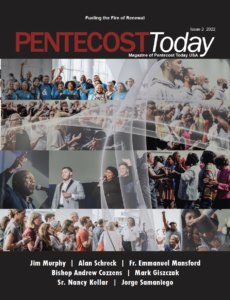Meditation and Questions for Reflection or Group Discussion
Mass Readings:
1st Reading: Isaiah 22:19-23
Responsorial: Psalm 138:1-3, 6,8
2nd Reading: Romans 11:33-36
Gospel: Matthew 16:13-20
Recognizing Jesus’ Mission to Bring New Life to the World
He strictly ordered his disciples to tell no one. (Matthew 16:20)
When the disciples heard Jesus say, “Do not tell anyone what you know,” they must have been surprised. Over and over again, they saw Jesus teach and perform awe-inspiring miracles. Over and over again, they saw crowds of people hanging on his every word.
Surely the people already knew that Jesus was a great teacher, a prophet, and a miracle worker. Now that he had plainly told his apostles who he was, it only made sense that they would tell everyone else the good news. But Jesus told them to remain quiet. So once again we are confronted with an awkward truth: when it comes to Jesus, we have to learn how to think differently about almost everything.
Jesus sounded his warning because he knew that the people would want to make him their king. In fact, John’s Gospel tells us that this is exactly what happened after the multiplication of the loaves. But John also tells us that Jesus was quick to withdraw to the mountains because he knew that an earthly kingship was not what his Father wanted for him (6:15).
Of course Jesus is our King. But his kingdom is not based on miracles, parables, or the homage of excited crowds. He didn’t “earn” his crown by performing signs and wonders and by speaking prophetic words. No, that happened only when he died on a cross. It was his death, not his miracles, that brought life to the world.
Jesus didn’t want anything to get in the way of his mission, not even the admiration of the very people he had come to save. He knew he had come to offer a humble sacrifice, not to stage a political revolution, and he was determined to stay faithful to that calling.
May we all pray for the humility and the resolve to be like Jesus. May nothing distract us from the call to “be merciful” as our heavenly Father is merciful (Luke 6:36).
“Lord, I want to be like you. Give me a heart of humility and loving service.”
Download this reflection with discussion questions here.
(Many thanks to The Word Among Us for allowing us to use meditations from their monthly devotional magazine. Used with permission. For more information on how to subscribe to their devotional magazine, go to www.wau.org).
Sunday, August 27, 2017
Questions for Reflection or Discussion:
- The first reading from Isaiah, tells of the Lord’s replacement of “Shebna, master of the palace” in Jerusalem with “Eliakim, son of Hilkiah.” The Lord goes on to describe Eliakim with these words: “He shall be a father to the inhabitants of Jerusalem, and to the house of Judah. I will place the key of the House of David on Eliakim’s shoulder; when he opens, no one shall shut when he shuts, no one shall open.”
- What do you think is the significance of these words of the Lord regarding Eliakim, especially the words: “I will place the key of the House of David on Eliakim’s shoulder”?
- In what ways do these words remind you of the messianic prophecies regarding Jesus in the Old Testament?
- The responsorial psalm begins with these words: “I will give thanks to you, O LORD, with all my heart, for you have heard the words of my mouth; in the presence of the angels I will sing your praise. I will give thanks to your name, because of your kindness and your truth: When I called, you answered me; you built up strength within me.” The psalm ends with these words: “Your kindness, O LORD, endures forever; forsake not the work of your hands.”
- How would you describe the reasons for the psalmist to “give thanks” and “sing” praise to the Lord? How would you describe your own reasons to do the same?
- In asking the Lord not to “forsake the work of his hands,” in what ways is the psalmist suggesting that he is still a work in progress?
- How would you describe the areas of your life that are still a work in progress, and how can you make yourself more available to the Lord to allow him to do some additional “tweaking” and formation?
- In the second reading, St. Paul’s amazement regarding God’s attributes is reflected in his opening words: “Oh, the depth of the riches and wisdom and knowledge of God!” He seems to be almost bowled over just thinking of God’s greatness: “How inscrutable are his judgments and how unsearchable his ways!”
- Does reflecting on “the depth of the riches and wisdom and knowledge of God” make him more or less approachable to you? Why?
- How could you include in your prayers some times for reflecting on God’s greatness, including his “riches,” “wisdom,” knowledge,” judgments,” and “ways”? Do you think this can help to draw you closer to him?
- In the Gospel, Jesus asks his disciples the following question: “Who do people say that the Son of Man is?” Simon Peter answers: “You are the Christ, the Son of the living God.” Notice how Jesus describes the source of Peter’s response: “Blessed are you, Simon son of Jonah. For flesh and blood has not revealed this to you, but my heavenly Father.”
- How would you answer Jesus’ question to his disciples: “Who do people say that the Son of Man is?”
- Do you believe your response requires revelation by your “heavenly Father” just as Peter’s did? Why?
- What do you think these words of Jesus mean, “I will give you the keys to the kingdom of heaven”? (Note: In the first reading, the Lord gives Eliakim the “key of the House of David.”)
- The meditation is a reflection on these final puzzling words of Jesus in the Gospel reading: “Then he strictly ordered his disciples to tell no one that he was the Christ.” It includes these words: “Of course Jesus is our King. But his kingdom is not based on miracles, parables, or the homage of excited crowds. He didn’t “earn” his crown by performing signs and wonders and by speaking prophetic words. No, that happened only when he died on a cross. It was his death, not his miracles, that brought life to the world. Jesus didn’t want anything to get in the way of his mission, not even the admiration of the very people he had come to save.”
- What do the words above from the meditation mean to you? In particular, what do these words mean to you, “He didn’t ‘earn’ his crown by performing signs and wonders and by speaking prophetic words. No, that happened only when he died on a cross. It was his death, not his miracles, that brought life to the world.”?
- In what ways has the Church helped you to grow closer to Jesus and to receive his ongoing grace in helping to bring “life to the world”?
- Take some time now to pray and ask the Lord for the grace to be like him in humility and service, especially, as we serve him in our families, his Church, and our society. Use the prayer below from the end of the meditation as the starting point.
“Lord, I want to be like you. Give me a heart of humility and loving service.”


 Click Here for us to pray for your intentions through our new website.
Click Here for us to pray for your intentions through our new website. 
